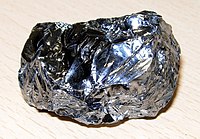
Photo from wikipedia
The activation of C−H bonds of alkanes remains a major challenge for chemistry. In a series of deuteration experiments with D2 in contact with bis‐(diphenylphosphino) butane (dppb) stabilized ruthenium nanoparticles… Click to show full abstract
The activation of C−H bonds of alkanes remains a major challenge for chemistry. In a series of deuteration experiments with D2 in contact with bis‐(diphenylphosphino) butane (dppb) stabilized ruthenium nanoparticles (liquid substrates, 60 °C, 6 bar D2) we have observed a surprisingly large reactivity of cyclopentane as compared to cyclohexane and other alkanes. DFT calculations using a ligand‐free Ru13H17 model cluster as catalyst indicate oxidative C−H cleavage of the bound substrates as rate limiting reaction step. They also indicate similar binding and activation enthalpies of reactions of cyclopentane and cyclohexane.
Journal Title: ChemCatChem
Year Published: 2018
Link to full text (if available)
Share on Social Media: Sign Up to like & get
recommendations!